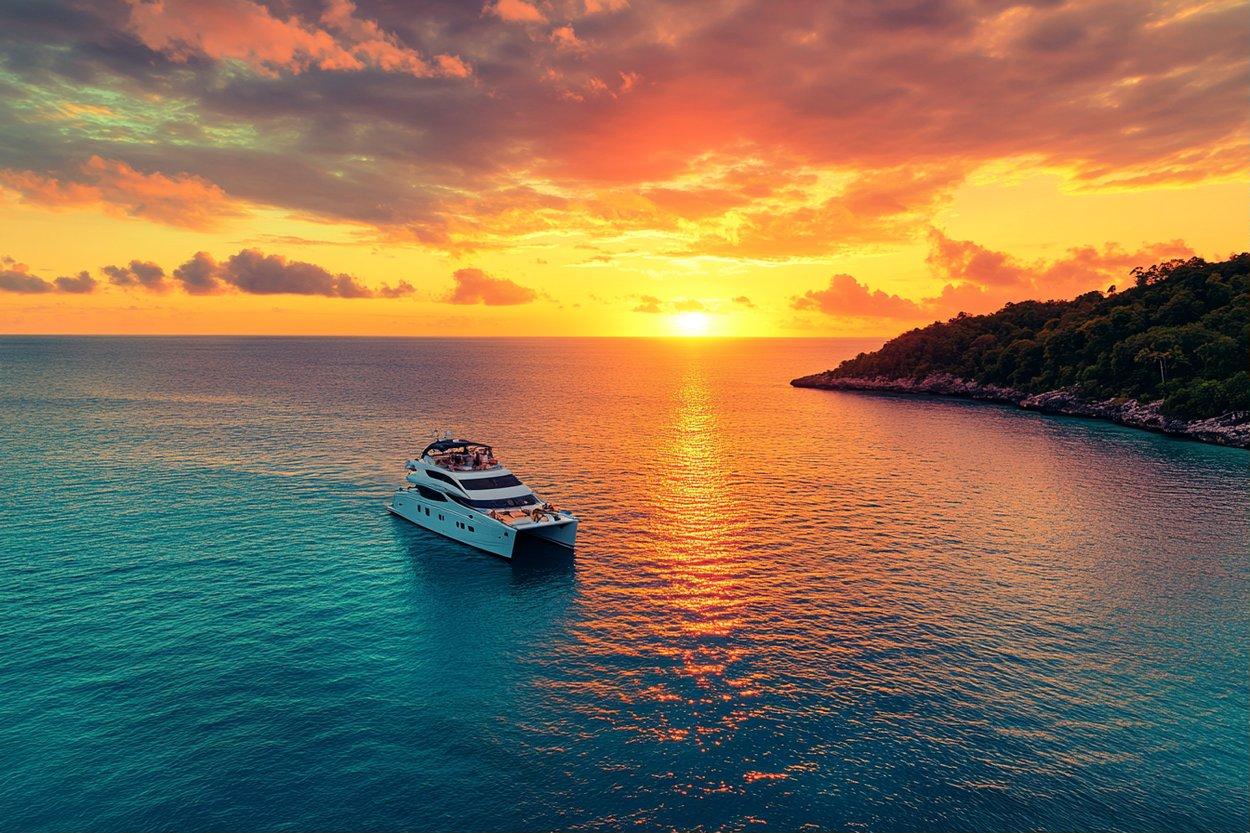Private Island Hopping: The Ultimate Luxury Travel Experience
Imagine waking up to the gentle lapping of crystal-clear waters against pristine white sand, with not another soul in sight except your chosen companions. The sun rises over your exclusive paradise, where staff cater to your every whim, and the day stretches ahead with endless possibilities for exploration, relaxation, and indulgence. This isn't just a fantasy—it's the reality of private island hopping, an elite travel experience that's becoming increasingly accessible to affluent travelers seeking the ultimate escape from civilization. While traditional luxury holidays offer five-star hotels and premium amenities, private island hopping elevates the concept of exclusivity to unprecedented heights, combining complete privacy with bespoke experiences in some of the world's most breathtaking locations.

The Allure of Private Island Experiences
The concept of private island vacations dates back centuries, with wealthy aristocrats and business magnates purchasing or leasing remote islands as personal retreats. However, the modern iteration of island hopping—visiting multiple exclusive islands during a single journey—has evolved dramatically in recent decades. The appeal lies in the unparalleled privacy, customization, and natural beauty these destinations offer. Unlike even the most luxurious resorts, private islands provide a complete escape from other tourists, allowing guests to experience pristine environments on their own terms.
The psychology behind the desire for private island experiences is fascinating—research shows that high-net-worth individuals increasingly value experiences over material possessions, and privacy has become the ultimate luxury in our constantly connected world. A private island stay represents the pinnacle of exclusivity, offering not just physical separation from crowds but also the emotional space to reconnect with oneself and loved ones without distractions.
Crafting the Perfect Island-Hopping Itinerary
The key to a successful private island-hopping adventure lies in thoughtful planning and curation. Experts recommend selecting islands that offer contrasting experiences—perhaps beginning with a developed private island resort before moving to progressively more remote and untouched destinations. The world’s premier private island destinations cluster in regions known for their spectacular marine environments: the Maldives, Seychelles, Caribbean, South Pacific, and certain parts of Southeast Asia lead the list.
Transportation between islands presents its own luxurious dimension to the experience. Seaplanes, private yachts, and helicopters serve as the preferred modes of transfer, each offering distinct advantages. Seaplanes provide breathtaking aerial views and efficient transit times, while private yacht charters allow for a more leisurely pace and the opportunity to explore uninhabited islands and premier snorkeling spots along the way. The most exclusive itineraries often combine these options, creating seamless transitions between destinations.
For those seeking the ultimate experience, yacht-based island hopping provides unmatched flexibility. Modern luxury vessels essentially function as floating private islands themselves, complete with staff, amenities, and the freedom to adjust itineraries based on weather conditions or personal preference. This approach maximizes time on the water while providing access to multiple islands without the need to pack and unpack.
Beyond the Beach: Curated Experiences on Private Islands
While pristine beaches form the backdrop of private island experiences, today’s sophisticated travelers demand more than just sun and sand. Leading private island destinations have responded with increasingly innovative and immersive offerings that transform a beach vacation into a comprehensive cultural and environmental experience.
Conservation-focused activities represent one of the fastest-growing trends in this space. Many private islands double as marine sanctuaries or environmental research stations, allowing guests to participate in coral restoration projects, sea turtle monitoring, or sustainable fishing initiatives guided by resident marine biologists. These experiences provide meaningful engagement with the local ecosystem while supporting critical conservation efforts.
Culinary experiences have also evolved dramatically, moving far beyond the expected seafood feasts. Many islands now feature garden-to-table programs where guests harvest ingredients alongside chefs before enjoying personalized cooking classes. Underground wine cellars, beachfront cooking demonstrations, and personalized menus based on guest preferences have become standard at top properties. Some islands even arrange visits from Michelin-starred guest chefs for special events.
Wellness offerings represent another area of significant innovation. Beyond traditional spa treatments, private islands now offer comprehensive wellness journeys incorporating indigenous healing traditions, meditation in specially designed natural settings, and personalized fitness regimes that take advantage of the natural environment. Several exclusive destinations have partnered with renowned wellness brands to create immersive retreat experiences within the private island context.
The Economics and Ethics of Private Island Travel
The financial aspects of private island hopping deserve examination. While undeniably expensive—with costs typically starting at $10,000 per night for exclusive island rentals—the industry has diversified significantly. Some private islands now offer individual villa rentals rather than whole-island bookings, making the experience more accessible to affluent rather than ultra-wealthy travelers. The pandemic accelerated this trend, as high-net-worth individuals sought safe, isolated vacation options.
The environmental and social impacts of private island tourism present both challenges and opportunities. Responsible operators have embraced this challenge, developing innovative sustainability initiatives that minimize ecological footprints while maximizing benefits to local communities. Leading examples include comprehensive water and waste management systems, renewable energy installations, and community development programs that employ and train local staff.
Some private islands have even pioneered conservation models where tourism directly funds environmental protection. In places like the Seychelles and parts of Indonesia, private islands serve as de facto marine protected areas, with portions of guest fees supporting conservation programs and scientific research. This model represents an evolution in luxury travel, where exclusivity and environmental responsibility become mutually reinforcing rather than contradictory values.
The Future of Private Island Experiences
Looking ahead, several trends are reshaping the private island landscape. Multigenerational travel is driving demand for larger accommodations and more diverse activity options to satisfy different age groups simultaneously. Technology integration is becoming more sophisticated, with islands balancing the desire for digital detox with guests’ needs for connectivity—often through discrete, on-demand systems that preserve the natural ambiance.
Perhaps most significantly, private island experiences are moving beyond traditional tropical paradises. Arctic and sub-Antarctic private islands now offer unique experiences for adventure-minded travelers, while desert islands and remote lake destinations provide alternatives to the classic beach setting. These emerging destinations suggest that the concept of private island hopping will continue to evolve, offering new interpretations of exclusivity and privacy.
The most forward-thinking island operators are already exploring the next frontier: underwater accommodations integrated into private island experiences. While currently limited to a few underwater suites and dining venues, plans for more substantial underwater structures suggest that future island-hopping itineraries may include not just island-to-island travel but vertical exploration from mountaintop villas to submerged accommodations on a single private property.
Essential Insights for the Private Island Traveler
-
Book at least 12 months in advance for prime destinations like the Maldives during peak season (December-March)
-
Consider shoulder seasons (May and November) for substantial savings averaging 30-40% while still enjoying favorable weather
-
Factor transportation costs into your budget planning – seaplane transfers in the Maldives can exceed $500 per person per segment
-
Research ownership structures – locally owned islands often provide more authentic cultural experiences than corporate-owned properties
-
Request detailed sustainability credentials before booking – genuine eco-conscious islands will have quantifiable metrics and certifications
-
Pack strategically for limited laundry services – lightweight, quick-dry fabrics are essential for island hopping itineraries
-
Verify communication capabilities if you need to stay connected – many islands have limited bandwidth despite advertising WiFi
-
Consider charter yacht combinations for maximum flexibility, especially in archipelago destinations like Croatia or the Bahamas
The essence of private island hopping lies not just in the exclusivity it offers but in the opportunity to experience multiple pristine environments in their most authentic form. As the world becomes increasingly connected and traditional luxury experiences more commonplace, the appeal of these secluded paradises continues to grow. Whether pursued as a once-in-a-lifetime splurge or as part of an ongoing lifestyle, island hopping represents the pinnacle of experiential luxury travel—a chance to explore paradise on one’s own terms, away from the crowds and constraints of everyday existence. In a world where true privacy has become the ultimate luxury, these floating sanctuaries offer something genuinely priceless: the freedom to experience extraordinary beauty in perfect tranquility.






